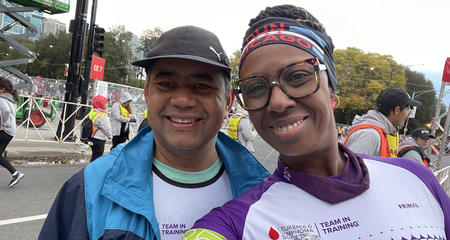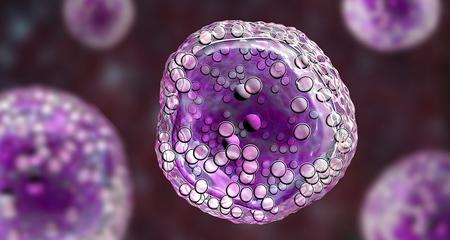We offer a variety of survivorship and support services to help you cope with the emotional and practical aspects of your transplant and guide you on the path to recovery.
As a vital member of your care team, you need to know what to expect and how to be an active participant in your care. From the initial phase of the transplant process to your gradual return to a normal routine after transplant, being informed reduces anxiety and provides a sense of control and hope.
We provide you and your family with a variety of educational options tailored to individual learning styles. Educational opportunities are delivered through one-on-one teaching by transplant coordinators, physicians, financial liaisons, social workers, pharmacists and nursing staff, as well as through videos and written educational information.
Through decades of treating patients undergoing blood and marrow transplants and treatment with cellular therapies and from answering questions from patients’ concerned families, we understand what you and your loved ones most want and need to know. You and your family have access to our series of expanded educational material that covers:
- How to Prepare for a Transplant
- Types of Transplants
- The Transplant Process
- What to Expect After a Transplant
We’ve also compiled some items you need to consider here.
Should I Participate in a Clinical Trial?
You may have the option of participating in a clinical trial as a treatment for your disease. Clinical trials answer specific research questions to find better ways to prevent, diagnose, treat and support people with diseases like yours. During your consultation, your physician will let you know if you are eligible for any studies at our institution. Learn more.
Financial Preparation
Work with our staff and your insurance company to make sure you are covered for your treatment – including experimental treatments and clinical trials. You will not be able to work, so investigate disability coverage and supplemental incomes. Check with your employer regarding paid leave, disability coverage, FMLA leave and maintaining your health insurance. Your caregiver should also look into these options.
Additionally, we have a great team of financial liaisons, social workers and financial counselors to help you with insurance or financial concerns.
Your Support System
The transplant and recovery process can have a significant impact on your family, work, friendships, community participation and hobbies. Support can mean many things from help with cooking, cleaning and errands to just sitting quietly and offering a comforting presence. We have proven materials to help prepare yourself, your family and friends for the challenges that lie ahead.
Choosing a Caregiver
Patients who are having a transplant must have a caregiver. In many cases, this will be a spouse or partner, but it could also be an adult child, another relative or a close friend. Having more than one caregiver is a good idea and allows the caregivers to balance working, helping you, and taking care of their own commitments and personal needs.
Whether you choose to have one or several caregivers, you are REQUIRED to have a caregiver prior to moving forward with a stem cell transplant.
Your caregiver is part of your transplant team, and the role is often stressful. Make sure the caregiver(s) you choose have the time as well as the physical and emotional capability for this role.
Your caregiver will have many responsibilities, which may include:
- Communicating and working with your medical team
- Driving you to appointments and taking notes
- Helping to care for you during the transplant and through your recovery
- Keeping track of finances
- Advocating for you
- Helping with house and yard upkeep
- Buying groceries and making meals
- Helping with medications and medical treatments
- Providing emotional support
- Communicating with your support network, family and friends.
Asking family and friends to be active participants in your care can seem overwhelming. Your transplant team will help you and your selected caregiver(s) better understand what tasks the caregiver is responsible for. It is also helpful to talk with your caregivers about what you want from them. Some patients want someone else to take charge of talking to doctors and making medical choices, while others mostly want emotional support.
Each transplant patient's needs are different. As you progress through diagnosis, transplant and recovery, your needs will continue to change. Each caregiver will find his or her own way to meet those needs. What is the same for everyone is that a caregiver plays a very important role in your treatment and recovery. Continued communication between you and your caregiver is extremely important to better prepare your caregiver for what you need most at each stage of the transplant process.
Caring for the Caregiver
Being a caregiver can be stressful and is not a job to do alone. You also need emotional and physical support in order to care for the patient. As a caregiver, it is important to ask for help.
Even if you are the main caregiver, try to delegate tasks to others and remember to take care of yourself as well as the patient, using your energy where it helps the patient the most. If a group is sharing the caregiver role, it is important to use organization and communication to successfully take care of the patient.
- Lotsa Helping Hands has a free online tool that allows families and friends to view what help is needed and when by using a private group web calendar.
- Share the Care is one website that provides ideas on how to organize a caregiving team.
Some self-care tips:
- Ask family and friends to help in providing meals, transportation and shopping.
- Take time out for yourself everyday even if it is just 15 minutes.
- Find someone to talk to who can give you emotional support.
- Focus on what is important.
- You cannot do everything.
- Reserve your energy for what really matters to you and the patient.
- Ask for help.
- Be willing to give up some of your daily and weekly tasks.
- Eat well-balanced meals.
- Exercise.
- Get enough sleep.
- Ask a friend or family member to be your advocate.
- Do something you love.
- Give yourself credit for the work you are doing.
There are several resources available regarding caregiver information and support. You can talk to one of our social workers regarding agencies that you can work with to hire a caregiver if necessary. Our social workers are also available to help with identifying available caregiver support groups.
Remember, you play a role in saving someone's life. Everything that you do to help the patient counts, whether it is a small task or ongoing support. It is important to understand the value of your role as a caregiver.
Care After a Transplant
After a transplant, you need strong support and careful monitoring. Because it takes time to develop a new immune system, we monitor you closely for months or even years to prevent and treat complications. You will visit our Outpatient Clinic for consultations, appointments and follow-up – including cancer rehabilitation and monitoring for graft versus host disease (allogeneic transplants).
Infection Prevention
Your risk of infection is higher than normal for about one year after transplant. Patients who are being treated for graft versus host disease are at increased risk for infection. You will receive medications to prevent and treat all types of infections. Please take them as prescribed and don't let the prescriptions run out. Talk with your doctor before taking over-the-counter medications or herbal therapies.
We will provide you with detailed instructions regarding hygiene, activities and infection prevention. Here are some basics.
- Wash your hands. It is key that both you and your loved ones practice good hand-washing techniques.
- Avoid large crowds and people who are sick.
- Avoid swimming and hot tubs until your doctor says it is safe.
- Wear a mask during hospital visits.
- Use lip balm and sunscreen with SPF 30 or above.
- Avoid anyone who has received a live virus vaccine for four weeks.
- Have older carpets cleaned before you return home from the hospital.
- Ask for help cleaning your house. You should not vacuum or dust for six months.
- Have air filters in your heating and air conditioning changed.
- Avoid gardening and yard work. Plants may remain in the house, but ask for help caring for them.
- Pets, aside from birds, may remain in the house. They should stay off furniture and clothing. Ask for help with cleaning up after them and grooming. Birds can return to the house when your doctor says it is safe.
- Wait for your doctor to tell you it is safe to hunt and fish again.
- Keep your windows closed and use the air conditioner.
- Ask your doctor about sexual activity.
Mid-Recovery
The mid-recovery phase of your transplant starts when you leave the hospital and extends to a year post-transplant. During this timeframe, your transplant team will keep a close watch on you. Here is what you can expect.
- You will have two or three outpatient visits per week until your counts are stable.
- After that, there will be weekly checks for any signs and symptoms of infection orn graft versus host disease.
- It is common for patients to get re-admitted to the hospital to treat post-transplant side effects.
- Post-transplant side effects can affect every major body system and require yearly health exams by different experts.
You will need to keep up with your yearly physicals and eye exams, preventive screenings and twice-annual dental check-ups.
Your transplant gave you a completely new immune system, removing any immunity you had from childhood vaccines. You will need to get all of these vaccinations again after:
- Your immune system recovers.
- You are off pills to suppress your immune system.
- You have no signs of chronic graft versus host disease.
This usually happens about one year after your transplant.
Long-Term Recovery
At one year after transplant, 82% of survivors have returned to work and report a high quality of life. You will still have preventive monitoring at 18 months, two years and three years after your transplant.
Based on the extent of your transplant issues, you can expect to return to your main oncologist after your transplant and your blood counts have returned to normal. Because of the extent of your treatment, it is important to know and understand what treatment you have received and when. It is also important to know the post-transplant issues that have occurred along with the date you received your transplant.
Some patients return to their pre-transplant lives smoothly. For others it is a harder to adjust to their new normal because of the financial, psychosocial or physical results of their treatment. During this time, we are always here to answer questions and help you to achieve your chosen post-transplant quality of life.
Survivorship Clinic
Bone marrow transplant is an important treatment that can help patients with diseases that were once thought to be incurable. Two years after undergoing a transplant, blood and marrow transplant survivors transfer their care to the Survivorship Clinic.
Doctors in the Survivorship Clinic have expertise in survivorship issues, including monitoring for long-term complications, immune rehabilitation, quality-of-life issues and physical and mental well-being to name a few. In this clinic, we monitor and promote routine health, screening, prevention and treatment of long-term side effects for transplant survivors.
Celebration of Life Event
When it is possible to hold in-person events, we invite patients who have received a blood or marrow transplant to attend a special Celebration of Life event. Patients have an opportunity to hear from blood and marrow transplant specialists and talk with other people who have experiences similar to theirs. The event is a source of hope, optimism and encouragement for patients — and medical staff find inspiration and continued motivation in each patient’s recovery.
Cancer Support Services
Our Cancer Network provides resources and services for all patients, including:
- 24-Hour Cancer Clinic
- Jeffrey C. Siegel Quality of Life Center
- Small Stones Wellness Center helps you manage changes in your appearance and promotes overall health and well-being.
- Art therapy
- Child life specialists to help children cope with the stress of an adult’s illness
- Smoking cessation (ask your provider for information)
- On-site services to deal with the social, emotional and financial issues related to illness and hospitalization
- Local area services, including restaurants, churches and synagogues, car rental, shopping and lodging options that may be helpful for patients and their families
- Support groups and classes — When in-person meetings resume or we start virtual groups
Additional Resources
- Be The Match® — The world’s largest registry of potential marrow donors, operated by the National Marrow Donor Program.
- Blood & Marrow Transplant Information Network — An educational resource for transplant patients and their families.
- National Bone Marrow Transplant information link — Helps patients, caregivers and families cope with the social and emotional challenges of bone marrow transplant by providing vital information and personalized support services.
- Leukemia and Lymphoma Society for additional support groups and information.
- Versiti — We have an established partnership with Versiti, which provides tissue typing and DNA testing for potential donors, as well as all of the blood products used by the BMT and Cellular Therapy Program.
More to Explore





